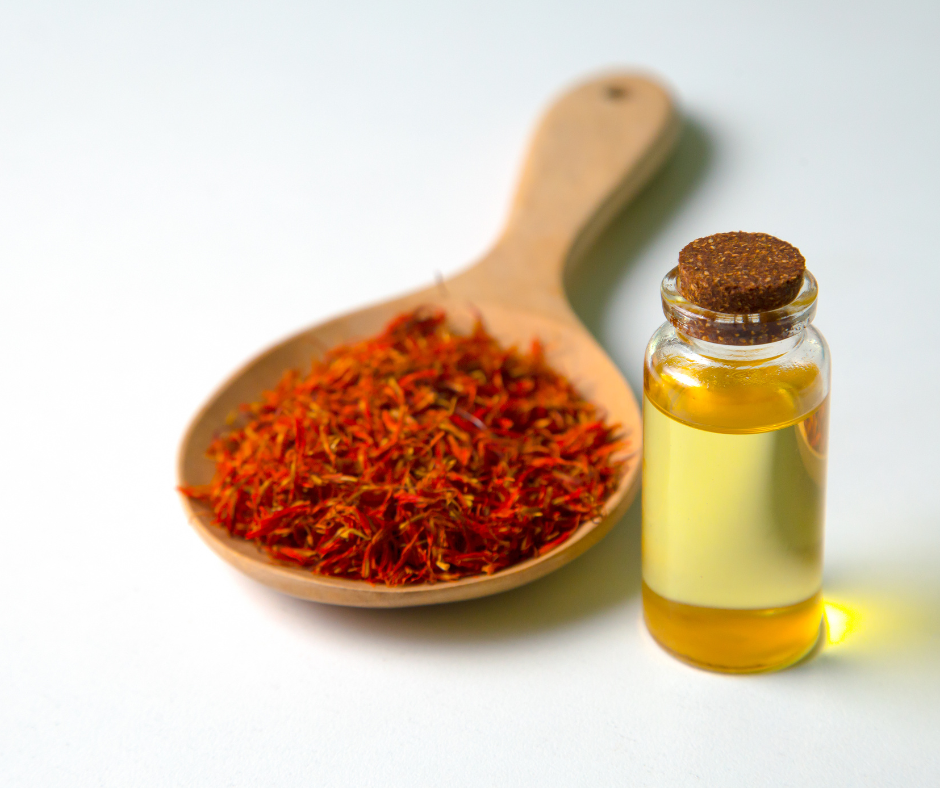
Safflower oil can serve as a better alternative to other cooking oils, but it is more costly than those oils. But what exactly are these health benefits, and how does this oil compare to others?
Carthamus tinctorius L., more commonly known as safflower, is a flowering plant in the Asteraceae family. Countries such as China, India, Iran, and Egypt are home to this thistle-like plant. However, it is grown everywhere, even in North America, primarily for its oil, but also as animal feed.
The seeds are the part of the plant that are processed to make the oil. There are two types of safflower oil: high linoleic and high oleic. The high linoleic type is high in polyunsaturated fats, while the high oleic type is high in monounsaturated fats.
Safflower oil high in linoleic acid is commonly used in margarine and salad dressings. While safflower oil rich in oleic acid is widely used for frying and other culinary applications due to its high smoke point. It is considered a healthy alternative to sunflower oil. Unlike sunflower oil, safflower oil has some unique bioactive compounds.
So is safflower oil the best choice for you? Or is it one of those healthy cooking oils which, when used in moderation, can be part of a healthy diet and lifestyle? Here is what you should know.
Learning About the Positive Effects of Safflower Oil on Your Health
1. A Good Source of Essential Fatty Acids
Monounsaturated and polyunsaturated fatty acids, both of which are beneficial to health, are found in abundance in safflower oil. Dietary fats like these are essential for proper hormone balance and long-term memory. They play an essential role in the process by which fat-soluble vitamins A, D, E, and K are absorbed by the body. Eating some fat with food can also help you feel full.
High-oleic and high-linoleic safflower oil are the two main types. Both are good sources of healthy unsaturated fats. The high-oleic type is a healthy alternative to olive oil for high-temperature cooking because it also contains monounsaturated fats. And high linoleic type is rich in polyunsaturated fats. It’s not good for heating, but it’s great for making salad dressings.
2. Fighting Inflammation
Many diseases, including autoimmune disorders, cardiovascular disease, and cancer, are thought to be caused by chronic inflammation. Safflower oil has been shown in some studies to have potent anti-inflammatory properties, including a reduction in many key markers of inflammation.
It’s worth noting that safflower oil is rich in omega-6 fatty acids, which can promote inflammation when consumed in excess. To get the most out of safflower’s potential health benefits, try eating it along with other healthy fats, such as plenty of omega-3 foods.
3. Promotes Glowing, Healthy Skin
If you have dry or irritated skin, you can try using safflower oil as a topical remedy to relieve discomfort and restore a healthy glow to your skin. Vitamin E, which is found in this cooking oil, may be responsible for the oil’s beneficial effects on the skin. Skincare products have relied on vitamin E as a key ingredient for decades.
Always do a skin test before fully applying safflower oil to your skin. Put a drop of oil on your arm and wait 24 hours. If there is no reaction, it is probably safe to use.
4. Maintains stable glucose levels
Some research suggests that safflower oil may be able to help people with diabetes maintain a healthy level of blood sugar, and may even lower their risk of developing diabetes-related complications.
In in vitro studies, the serotonins in safflower oil inhibited the action of alpha-glucosidase, an enzyme responsible for converting starch to sugar. This mechanism suggests that this cooking oil may hold promise as a diabetes-friendly diet. It may also reduce the amount of glucose absorbed from starch in food, resulting in lower postprandial glucose levels.
In addition, another study found that replacing saturated fat with monounsaturated fats like safflower oil may increase insulin sensitivity, allowing the body to better use insulin to maintain steady blood sugar levels.
5. Strengthens the Heart and Lowers Cholesterol
LDL cholesterol is the “bad” cholesterol. Safflower oil can help you maintain a healthy level of LDL cholesterol, which is good for your heart. You can lower your LDL cholesterol with it without affecting your good cholesterol (HDL).
A high LDL level puts you at a higher risk of having a heart attack or stroke. Bad cholesterol is raised by a diet high in saturated and trans fats. Using safflower oil instead of other oils in cooking can help lower your cholesterol.
There may be other ways that this cooking oil helps the heart. Safflower oil’s unsaturated fats help reduce blood viscosity and platelet adhesion. Blood clots are dangerous and can cause cardiac arrest or stroke. It’s possible that safflower oil may have a calming effect on blood vessels and lower blood pressure.
While the benefits of safflower may be tempting, it is still a good idea to talk to your healthcare provider before adding it to your diet or using it topically. Some of the side effects of safflower could end up being harmful to you.
Safflower oil can increase the effects of blood-thinning medications, so it should be used with caution before surgery or if you have a bleeding disorder. Pregnant women should stay away from safflower products because of their abortifacient properties.
Safflower compounds may also have adverse effects on male fertility, as demonstrated by their toxicity to testicular tissue in mouse models (high doses of safflower extract can reduce sperm count).
You can find oils with similar health benefits to safflower oil elsewhere, such as sunflower oil, which is a close relative.
Disclaimer: This is for informational purposes only.
Did you find this helpful? Let us know in the comments.
Source: MedicalNewsToday
You can also visit our Facebook and YouTube pages to know more about plants and their health benefits.
You might also like:








